| News Article Tape: |
| Blog Entry Tape: |
Tuesday, December 26, 2006
December 26th forum announcement
Dear Poetry Buffs,
Poetry & Poets in Rags
The days are getting longer now, here in the northern hemisphere, as we share daylight with you in the southern. I hope your holidays are going well.
In News at Eleven, I have paired up two poems dealing with the same subject: animals kneeling, as in the nativity. There are a few more Christmas poems in Great Regulars, for those of you who know enough to file these finds away.
We begin, though, with a 2005 poem, one you may have read before, called "Eulogy" by Brian Turner. What I did not know, is that Pfc. Bruce Miller loved poetry. Electronic Iraq was sensitive enough to publish this with commentary as we hear news of the suicide rate among the troops. Which reminds me: don't forget to check the Poetic Obituaries.
As with each week, we have many poems and commentary on them in Great Regulars. Also in that section, I want to note that after reading Frank Wilson's excellent essay on Keats, click into the Daily Times Purple Patch article by Princeton's Michael Wood.
See you next year. Thanks for this one.
Yours,
Rus
Our links:
IBPC: Poetry & Poets in Rags
Poetry & Poets in Rags Blog
IBPC Home
IBPC Newswire
~~~~~~~~~~~
Poetry & Poets in Rags
The days are getting longer now, here in the northern hemisphere, as we share daylight with you in the southern. I hope your holidays are going well.
In News at Eleven, I have paired up two poems dealing with the same subject: animals kneeling, as in the nativity. There are a few more Christmas poems in Great Regulars, for those of you who know enough to file these finds away.
We begin, though, with a 2005 poem, one you may have read before, called "Eulogy" by Brian Turner. What I did not know, is that Pfc. Bruce Miller loved poetry. Electronic Iraq was sensitive enough to publish this with commentary as we hear news of the suicide rate among the troops. Which reminds me: don't forget to check the Poetic Obituaries.
As with each week, we have many poems and commentary on them in Great Regulars. Also in that section, I want to note that after reading Frank Wilson's excellent essay on Keats, click into the Daily Times Purple Patch article by Princeton's Michael Wood.
See you next year. Thanks for this one.
Yours,
Rus
Our links:
IBPC: Poetry & Poets in Rags
Poetry & Poets in Rags Blog
IBPC Home
IBPC Newswire
~~~~~~~~~~~
News at Eleven: Soldier suicides in Iraq
 are hardly endemic, but that makes the numbers no less tragic. Here's [Brian] Turner's poem, eulogizing PFC B. Miller, who took his life in Iraq on March 22, 2004. He was 24.
are hardly endemic, but that makes the numbers no less tragic. Here's [Brian] Turner's poem, eulogizing PFC B. Miller, who took his life in Iraq on March 22, 2004. He was 24.Eulogy
from Electronic Iraq: Soldier Suicides
~~~~~~~~~~~
News at Eleven: well mi dhu day wok an mi dhu nite wok
 mi dhu clean wok and mi dhu dutty wok
mi dhu clean wok and mi dhu dutty wokdem seh dat black man is very lazy
but if yu si how mi wok yu woodah seh mi crazy
LKJ [Linton Kwesi Johnson] has helped legitimize a language previously dismissed as the "pidgin" English of people too uneducated or lazy (or both) to grasp proper English, introducing it to the world in poetry.
from In These Times: Dread Beats
~~~~~~~~~~~
News at Eleven: If we're not yet convinced, a dictionary's
 visual description of these fish being "like shad but stouter, more compressed," with the "sh"sound bringing to mind Muldoon's great precursor and contemporary, Seamus Heaney; then "stouter, more compressed," linking the two poets through allusion to their native island's most famous libation, should give us evidence enough to believe we're . . . well, we're at least on to something. Have I gone too far? Very likely.
visual description of these fish being "like shad but stouter, more compressed," with the "sh"sound bringing to mind Muldoon's great precursor and contemporary, Seamus Heaney; then "stouter, more compressed," linking the two poets through allusion to their native island's most famous libation, should give us evidence enough to believe we're . . . well, we're at least on to something. Have I gone too far? Very likely.from The Globe and Mail: Muldoon: playful and profound
~~~~~~~~~~~
News at Eleven: There's little narrative, scant punctuation,
 no prescribed continuity and few lines (if you could call them lines) more than three or four words long. Occasionally the words disintegrate altogether into stray strings of letters or sounds ("ssssss," "tta ttattatta," "aiiiiii!").
no prescribed continuity and few lines (if you could call them lines) more than three or four words long. Occasionally the words disintegrate altogether into stray strings of letters or sounds ("ssssss," "tta ttattatta," "aiiiiii!").from Los Angeles Times: Rants, raves, Futurist poems
~~~~~~~~~~~
News at Eleven: Where in "Easter," a child's shame
 receives full, scrupulous representation, in "Sully: Sixteen Months" the child has merely tripped on a toy only to be comforted immediately by his mother and grandfather. There are hazards to being around one's grandchildren, and one of them is that a person's poems will suffer. (Williams’s early poems about his children, by contrast, were dispassionate, honest and grave.)
receives full, scrupulous representation, in "Sully: Sixteen Months" the child has merely tripped on a toy only to be comforted immediately by his mother and grandfather. There are hazards to being around one's grandchildren, and one of them is that a person's poems will suffer. (Williams’s early poems about his children, by contrast, were dispassionate, honest and grave.)from The New York Times: False Consolations
~~~~~~~~~~~
News at Eleven: On the CD that accompanies this collection,
 [Galway] Kinnell prefaces the poem "Shelley" by saying: "There's a theory that goes around that I've heard many times that it doesn't matter how many wrecked lives lie behind us, the important thing is to get that brilliant painting, that amazing sonata, that great poem, and all sins are forgotten. But I really don't believe this. I think, actually, on the contrary, it's the absence of the feelings for others, for one's loved ones, that damages the great work."
[Galway] Kinnell prefaces the poem "Shelley" by saying: "There's a theory that goes around that I've heard many times that it doesn't matter how many wrecked lives lie behind us, the important thing is to get that brilliant painting, that amazing sonata, that great poem, and all sins are forgotten. But I really don't believe this. I think, actually, on the contrary, it's the absence of the feelings for others, for one's loved ones, that damages the great work."from Los Angeles Times: 'Strong Is Your Hold' by Galway Kinnell and 'The Poems of Robert Lowell'
~~~~~~~~~~~
News at Eleven: Here is how [Craig] Raine handles
 the matter (there's no other way to demonstrate his technique than to quote at length):
the matter (there's no other way to demonstrate his technique than to quote at length): "These are very difficult poems. Yet [Anthony] Julius is prepared to preface hostile readings of Eliot's poems thus: 'While the poem cannot be reduced to a resolvable riddle, its hostility to Jews is instantly recognizable'; 'whatever its interpretative obscurities . . .' In other words: 'I do not understand this poetry but I know for a certainty it is anti-Semitic.'"
from Jewish Exponent: 'Underneath the Lot'
~~~~~~~~~~~
News at Eleven: Purchasing The Ellsworth American in Ellsworth,
 Maine, in 1971, opened a new chapter in [James Russell] Wiggins’ life as a poet. Every week for nearly 30 years, he wrote a poem for the editorial page of the paper. (Since his death in 2000, the American has continued to print a poem each week, recycling the hundreds written over several decades.)
Maine, in 1971, opened a new chapter in [James Russell] Wiggins’ life as a poet. Every week for nearly 30 years, he wrote a poem for the editorial page of the paper. (Since his death in 2000, the American has continued to print a poem each week, recycling the hundreds written over several decades.)from The Ellsworth American: The Poetry of James Russell Wiggins
~~~~~~~~~~~
News at Eleven: The Times Colonist has invited six
 renowned poets, all living on Vancouver Island, to offer a special poem for the season to readers of this newspaper. Lorna Crozier's poem is the first, and over the rest of the week we'll present the works of five more poets.
renowned poets, all living on Vancouver Island, to offer a special poem for the season to readers of this newspaper. Lorna Crozier's poem is the first, and over the rest of the week we'll present the works of five more poets.Midnight Watch
from Victoria Times Colonist: Poems for the holiday
~~~~~~~~~~~
News at Eleven: [Thomas Hardy] remembers sitting
 with other children by the fireside at midnight, listening wide-eyed to the adults tell them that the animals are kneeling now in their "strawy pen." You're there. You can see it. As a child, Hardy believed it completely.
with other children by the fireside at midnight, listening wide-eyed to the adults tell them that the animals are kneeling now in their "strawy pen." You're there. You can see it. As a child, Hardy believed it completely.from The News Journal: A contemporary Christmas poem
~~~~~~~~~~~
News at Eleven (Back Page): [Percy Bysshe Shelley] tore off "a surprising
 quantity" of bread, piled it in a bowl and poured on boiling water. Then he strewed it with nutmeg, which made it look interestingly gory. "I lap up the blood of murdered kings!" screamed the poet, applying the spoon. And then the finishing, irresistible touch: a sprinkling of loaf sugar, the blood of slaves.
quantity" of bread, piled it in a bowl and poured on boiling water. Then he strewed it with nutmeg, which made it look interestingly gory. "I lap up the blood of murdered kings!" screamed the poet, applying the spoon. And then the finishing, irresistible touch: a sprinkling of loaf sugar, the blood of slaves.from The Economist: Sugar: Sick with excess of sweetness
~~~~~~~~~~~
Great Regulars: The announcement, which was made on
 the website of JK Rowling's UK publisher, Bloomsbury, puts an end to months of internet speculation, with guesses ranging from Harry Potter and the Pyramids of Furmat to Harry Potter and the Graveyard of Memories.
the website of JK Rowling's UK publisher, Bloomsbury, puts an end to months of internet speculation, with guesses ranging from Harry Potter and the Pyramids of Furmat to Harry Potter and the Graveyard of Memories.from Sarah Crown: The Guardian: Final Harry Potter title revealed
~~~~~~~~~~~
Great Regulars: "I think it's important to send material
 out constantly once it's in presentable form," [Noel] Sloboda says. "And while waiting for response, it's best to keep writing, to work on the next thing rather than to focus energy on what's in the mail. For every acceptance, I have at least half a dozen rejections. I have had some poems returned more than 20 times. Eventually, though, most good writing finds a home."
out constantly once it's in presentable form," [Noel] Sloboda says. "And while waiting for response, it's best to keep writing, to work on the next thing rather than to focus energy on what's in the mail. For every acceptance, I have at least half a dozen rejections. I have had some poems returned more than 20 times. Eventually, though, most good writing finds a home."from Bill Diskin: The York Daily Record: Poetryork: Penn State York instructor practices what he teaches
~~~~~~~~~~~
Great Regulars: In short, then [on Denise Low],
 she's a good ambassador for verse, and I think that's what any state's poet laureate is supposed to be.
she's a good ambassador for verse, and I think that's what any state's poet laureate is supposed to be.So there's the nice little present, all dolled up with ribbons and bows. Now for the lump of coal: Where, oh where, is Missouri's poet laureate?
from John Mark Eberhart: The Kansas City Star: Show Me a Poet Laureate
~~~~~~~~~~~
Great Regulars: I want you to think, "I'll be
 a happier person if I read a little poetry before going to sleep."
a happier person if I read a little poetry before going to sleep."I want you to be inspired to say to your partner at the end of the day, "Sit down and let me read you this poem before supper."
What Sign?
from Elizabeth W. Garber: Village Soup: A Year of Poetry from a Wealth of Maine Poets: At the end of a year of poetry
~~~~~~~~~~~
Great Regulars: "Marks" means grades, and
 each family member has his or her own system of grading the mother: the husband uses letter grades, giving his wife an "A/for last night's supper." She gets and "I"--incomplete--for ironing, because no doubt she didn't finish and probably left some of his clothes unironed.
each family member has his or her own system of grading the mother: the husband uses letter grades, giving his wife an "A/for last night's supper." She gets and "I"--incomplete--for ironing, because no doubt she didn't finish and probably left some of his clothes unironed.from Linda Sue Grimes: Suite101.com: Linda Pastan's 'Marks': A Playful Poem
~~~~~~~~~~~
Great Regulars: And my husband finally said
 he was tired of hearing what a good poet I would have been if I hadn't gotten married. Let's do something about it. [--Linda Pastan]
he was tired of hearing what a good poet I would have been if I hadn't gotten married. Let's do something about it. [--Linda Pastan]They obviously did something about it quite well.
from Linda Sue Grimes: Suite101.com: National Treasure--Linda Pastan: No Angel Speaks to Me
~~~~~~~~~~~
Great Regulars: The speaker continues metaphorically comparing
 nature to God, when he says, "In the arteries of leaves/I see Thy blood flowing." Everywhere the speaker looks, he sees aspects of God.
nature to God, when he says, "In the arteries of leaves/I see Thy blood flowing." Everywhere the speaker looks, he sees aspects of God.from Linda Sue Grimes: BellaOnline: Paramahansa Yogananda’s "Leave Thy Vow of Silence"
~~~~~~~~~~~
Great Regulars: Poem: "Benediction"
 by Stanley Kunitz, from The Collected Poems. © W.W. Norton.
by Stanley Kunitz, from The Collected Poems. © W.W. Norton.from Garrison Keillor: The Writer's Almanac: For the week of December 25, 2006
~~~~~~~~~~~
Great Regulars: But you can probably get a better idea
 of funk by watching your Aunt Tilda take the dance floor at a bar mitzvah party while the band pumps out James Brown's Papa's Got a Brand New Bag.
of funk by watching your Aunt Tilda take the dance floor at a bar mitzvah party while the band pumps out James Brown's Papa's Got a Brand New Bag.from David Kirby: Sun-Sentinel: From the Stones to funk grooves
~~~~~~~~~~~
Great Regulars: How many of us,
 when passing through some small town, have felt that it seemed familiar though we've never been there before. And of course it seems familiar because much of the course of life is pretty much the same wherever we go, right down to the up-and-down fortunes of the football team and the unanswered love letters. Here's a poem by Mark Vinz.
when passing through some small town, have felt that it seemed familiar though we've never been there before. And of course it seems familiar because much of the course of life is pretty much the same wherever we go, right down to the up-and-down fortunes of the football team and the unanswered love letters. Here's a poem by Mark Vinz.Driving Through
from Ted Kooser: American Life in Poetry: Column 091 (pdf)
~~~~~~~~~~~
Great Regulars: [Frank] O'Hara's Christmas poem
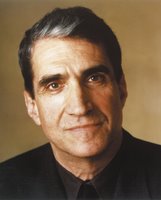 is as secular as can be--personal, artfully irreverent and saucy. The poem is also a sincere celebration of the holiday and his city. It is a passionate, good-humored embrace and a love song to Manhattan.
is as secular as can be--personal, artfully irreverent and saucy. The poem is also a sincere celebration of the holiday and his city. It is a passionate, good-humored embrace and a love song to Manhattan.from Robert Pinsky: The Washington Post: Poet's Choice
~~~~~~~~~~~
Great Regulars: [Shri Srinivasa] Rangaswami's poetry
 is a conversation with the World. It is a conversation with the words on the page in which he allows those words to speak back to you. Indeed, his poetry is a timeless conversation with himself and yourself.
is a conversation with the World. It is a conversation with the words on the page in which he allows those words to speak back to you. Indeed, his poetry is a timeless conversation with himself and yourself. from V Sundaram: News Today: A tribute to a poet
~~~~~~~~~~~
Great Regulars: You need to say it aloud. In fact,
 it is best to memorize it, so that you can just say it and shape it as you would a musical composition. Consider the magical precision of the words--"a draught of vintage," "a beaker full of the warm South," "beaded bubbles winking at the brim . . ."
it is best to memorize it, so that you can just say it and shape it as you would a musical composition. Consider the magical precision of the words--"a draught of vintage," "a beaker full of the warm South," "beaded bubbles winking at the brim . . ."from Frank Wilson: Philadelphia Inquirer: Books Inq.: I have been reading . . .
~~~~~~~~~~~
Great Regulars: Being now resolved to be a poet, I saw
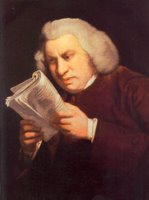 every thing with a new purpose; my sphere of attention was suddenly magnified: no kind of knowledge was to be overlooked. I ranged mountains and deserts for images and resemblances, and pictured upon my mind every tree of the forest and flower of the valley.
every thing with a new purpose; my sphere of attention was suddenly magnified: no kind of knowledge was to be overlooked. I ranged mountains and deserts for images and resemblances, and pictured upon my mind every tree of the forest and flower of the valley.from Daily Times: Purple Patch: Enough! --Samuel Johnson
~~~~~~~~~~~
Great Regulars: Literature does not simply refresh
 us so that we can return to non-literary work, it helps us to do the work of deciding what we do and do not know. Literature, to repeat, renders all knowledge hypothetical, it pretends to affirm when it is not affirming.
us so that we can return to non-literary work, it helps us to do the work of deciding what we do and do not know. Literature, to repeat, renders all knowledge hypothetical, it pretends to affirm when it is not affirming.from Daily Times: Purple Patch: If you say so --Michael Wood
~~~~~~~~~~~
Great Regulars: Though authors are touchy
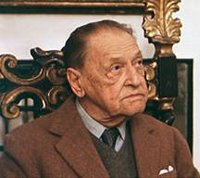 about their productions and inclined to resent unfavourable criticism they are seldom self-satisfied. They are conscious how far the work on which they have spent much time and trouble comes short of their conception, and when they consider it are much more vexed with their failure to express this in its completeness than pleased with the passages here and there that they can regard with complacency.
about their productions and inclined to resent unfavourable criticism they are seldom self-satisfied. They are conscious how far the work on which they have spent much time and trouble comes short of their conception, and when they consider it are much more vexed with their failure to express this in its completeness than pleased with the passages here and there that they can regard with complacency.from Daily Times: Purple Patch: Of Human Bondage --Somerset Maugham
~~~~~~~~~~~
Great Regulars: [Rosie King's] first book,
"Sweetwater, Saltwater," is forthcoming from Hummingbird Press in February.
The Blue Sky at Pinnacles Again
from Good Times Weekly: Poetry Corner
~~~~~~~~~~~
The Blue Sky at Pinnacles Again
from Good Times Weekly: Poetry Corner
~~~~~~~~~~~
Great Regulars: In winter, they say, the earth rests,
 animals sleep, and humans reflect. Here we offer some poems of reflection
animals sleep, and humans reflect. Here we offer some poems of reflection'Snow'
from Kansas City Star: Soltice songs
~~~~~~~~~~~
Great Regulars: By Dan McCarthy
Reasons to Celebrate an Early Yugoslavian Spring Day
from Lawrence Journal-World: Poet's Showcase
~~~~~~~~~~~
from Lawrence Journal-World: Poet's Showcase
~~~~~~~~~~~
Great Regulars: [John Garton Wharton] wrote this poem
 after reading about the war in Iraq. "War is a horrible thing that can tear at your mind and your heart even when you're not involved. I've heard that we rid Iraq of a tyrant. True tyrants do not hide in holes."
after reading about the war in Iraq. "War is a horrible thing that can tear at your mind and your heart even when you're not involved. I've heard that we rid Iraq of a tyrant. True tyrants do not hide in holes."from The Philadelphia Inquirer: Reader Poetry
~~~~~~~~~~~
Poetic Obituaries: [Linda Bain] was an accomplished
 photographer and poet. She was also an exceedingly generous patron of a wide variety of projects, causes and institutions, not the least of which was The American-Scottish Foundation Inc., on the board of which she served for a number of years, and of which her husband was president.
photographer and poet. She was also an exceedingly generous patron of a wide variety of projects, causes and institutions, not the least of which was The American-Scottish Foundation Inc., on the board of which she served for a number of years, and of which her husband was president.from The Suffolk Times: Linda Miller Bain
~~~~~~~~~~~
Poetic Obituaries: [Yesenia Nungaray Becerra] liked to write poems
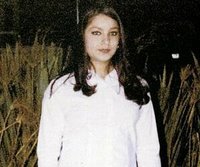 and kept a journal.
and kept a journal."She was a very caring kid--loved her younger brother, loved her older brother. Baby-sat. Worked very hard for her mother. Very respectful, pretty much was raised by her grandparents," [Sgt. Scott] Dudek said. "Her grandparents worshipped her."
from Contra Costa Times: No longer 'Jane Doe:' 2003 murder victim finally named
~~~~~~~~~~~
Poetic Obituaries: Renowned poet John Heath-Stubbs has died
 at a nursing home in west London at the age of 88.
at a nursing home in west London at the age of 88.Mr Heath-Stubbs, who lost his sight completely in 1978, was also a translator, critic and anthologist.
from BBC News: Poet John Heath-Stubbs dies at 88
~~~~~~~~~~~
Poetic Obituaries: Being a literary figure, he [Hakim Manzoor] wrote
books both in Urdu and Kashmiri and gained recognition for his poetry. Through his poetry, he highlighted the pain and agony of Kashmiris and the suppression they have had to face, said Zareef.
from Greater Kashmir: Hakim Manzoor dies at 69
~~~~~~~~~~~
from Greater Kashmir: Hakim Manzoor dies at 69
~~~~~~~~~~~
Poetic Obituaries: Vivian Pierson Ramsey, a longtime newspaper columnist
 and poet whose works often centered on her beloved Greenfield, died Sunday after having a stroke.
and poet whose works often centered on her beloved Greenfield, died Sunday after having a stroke.She was 90.
from The Indianapolis Star: Vivian Ramsey was newspaper columnist with a big personality
~~~~~~~~~~~
Poetic Obituaries: Ellen S. Tifft, a poet and novelist
 whose work was published by the New Yorker and other national magazines, died Sunday at the Skilled Nursing Facility at St. Joseph's Hospital in Elmira. Tifft was 90.
whose work was published by the New Yorker and other national magazines, died Sunday at the Skilled Nursing Facility at St. Joseph's Hospital in Elmira. Tifft was 90.from Star-Gazette: Elmira writer will be missed in her beloved hometown
~~~~~~~~~~~
Poetic Obituaries: Despite the calls for his arrest, the doctor,
 Mario Riccio, an anesthesiologist, said he was "serene" that he would not be prosecuted.
Mario Riccio, an anesthesiologist, said he was "serene" that he would not be prosecuted. "The case of Piergiorgio Welby is not a case of euthanasia," he told reporters here. "It’s a case of refusing treatment."
from The New York Times: Italian Poet Dies With Help From a Doctor
~~~~~~~~~~~
Tuesday, December 19, 2006
December 19th forum announcement
Dear Poetry Buffs,
Poetry & Poets in Rags
It is the Rags before Christmas, and yes, we address (what seems to be) Henry Livingson's verse in our Great Regulars section, along with Christmas poems by Anna George Meek and Christopher Logue there. Our News at Eleven headliner, though, is Henry Wadsworth Longfellow's "I Heard the Bells on Christmas Day," a hymn of peace written in time of war.
Indeed, in our first several articles, and in much from our Great Regulars, a worldwide, cross-cultural theme arises from different quarters and wisdom systems of the world. Beyond the seasonal wish, it appears that heading into this winter solstice, remarkable seeds have been planted. These articles address clearly the war and strife in our world, yet through thoughtful underpinnings of healing and heartfelt good will. Today, it is okay to bring wisdom, from wherever it arises, to bear in addressing peace on earth. These are the bells we hear ringing this Christmastime.
This week we welcome two Great Regulars. Frieda Hughes has been writing her column for the Times, and making News at Eleven whenever she has. She appears in Great Regulars twice this week. And so does our other new Great Regular, The Brooklyn Rail, specifically the poetry they publish, which has several times, and invariably, made News at Eleven. The Brooklyn Rail also accomplishes a rarity that I believe only The Guardian has done before, with articles in each of our three sections. Indeed, the very last Poetic Obituary is great reading by poet Anne Waldman.
Till ringing, singing on its way
The world revolved from night to day,
A voice, a chime, a chant sublime
Of peace on earth, good will to men.
A sub-lime Christmas for peace to you all.
Yours,
Rus
Our links:
IBPC: Poetry & Poets in Rags
Poetry & Poets in Rags Blog
IBPC Home
IBPC Newswire
~~~~~~~~~~~

Wallpaper image from Ingalills Theme Design
_____
Poetry & Poets in Rags
It is the Rags before Christmas, and yes, we address (what seems to be) Henry Livingson's verse in our Great Regulars section, along with Christmas poems by Anna George Meek and Christopher Logue there. Our News at Eleven headliner, though, is Henry Wadsworth Longfellow's "I Heard the Bells on Christmas Day," a hymn of peace written in time of war.
Indeed, in our first several articles, and in much from our Great Regulars, a worldwide, cross-cultural theme arises from different quarters and wisdom systems of the world. Beyond the seasonal wish, it appears that heading into this winter solstice, remarkable seeds have been planted. These articles address clearly the war and strife in our world, yet through thoughtful underpinnings of healing and heartfelt good will. Today, it is okay to bring wisdom, from wherever it arises, to bear in addressing peace on earth. These are the bells we hear ringing this Christmastime.
This week we welcome two Great Regulars. Frieda Hughes has been writing her column for the Times, and making News at Eleven whenever she has. She appears in Great Regulars twice this week. And so does our other new Great Regular, The Brooklyn Rail, specifically the poetry they publish, which has several times, and invariably, made News at Eleven. The Brooklyn Rail also accomplishes a rarity that I believe only The Guardian has done before, with articles in each of our three sections. Indeed, the very last Poetic Obituary is great reading by poet Anne Waldman.
Till ringing, singing on its way
The world revolved from night to day,
A voice, a chime, a chant sublime
Of peace on earth, good will to men.
A sub-lime Christmas for peace to you all.
Yours,
Rus
Our links:
IBPC: Poetry & Poets in Rags
Poetry & Poets in Rags Blog
IBPC Home
IBPC Newswire
~~~~~~~~~~~

News at Eleven: And in despair I bowed my head,
 "There is no peace on earth," I said.
"There is no peace on earth," I said. "For hate is strong and mocks the song
Of peace on earth, good will to men."
The U.S. Civil War was still raging when [Henry Wadsworth] Longfellow wrote those words. Over 600,000 died (some estimates are closer to 700,000), more than half due to disease and primitive medical care.
from Southwest Farm Press: Peace still an elusive goal
~~~~~~~~~~~
News at Eleven: [Mevlana's] tolerance and humanism were best
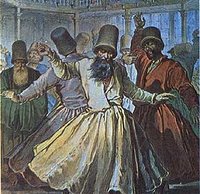 expressed in the lines that so many people know:
expressed in the lines that so many people know:Come, come whoever you are,
An unbeliever, a fire-worshipper, come.
Our convent is not of desperation,
Even if you have broken your vows a hundred times,
Come, come again.
from Turkish Daily News: Mevlana: on the 733rd anniversary of his death
~~~~~~~~~~~
News at Eleven: "There can be no living culture
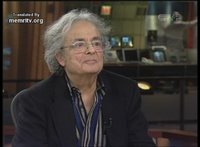 in the world if you cannot criticize its foundations--the religion.
in the world if you cannot criticize its foundations--the religion. "We lack the courage to ask any question about any religious issue.
"For example, as a Muslim, I cannot say a single word about the Prophet Moses.
"The Prophet Moses did not say anything to me as a Muslim, whereas the Israeli Jew can criticize Moses and all the prophets in the Torah, and he can even question the divinity of the Torah."
from The Middle East Media Research Institute: Renowned Syrian Poet 'Adonis': 'We, In Arab Society, Do Not Understand The Meaning Of Freedom'
~~~~~~~~~~~
News at Eleven: Syrian poet Abid Ismail sought to find
 reasons for this estrangement between Arab writers and the unfolding events in Iraq, he says: "Indeed, with the exception of Iraqi writers, no one seems to care! You find yourself trapped in a lose-lose situation; if you condemn the war [the resistance], you will be accused by the majority of Iraqis as advocating the oppressor, and if you support the war, you will be supporting the occupation! The Iraqi issue is obscure--unlike the situation in Lebanon."
reasons for this estrangement between Arab writers and the unfolding events in Iraq, he says: "Indeed, with the exception of Iraqi writers, no one seems to care! You find yourself trapped in a lose-lose situation; if you condemn the war [the resistance], you will be accused by the majority of Iraqis as advocating the oppressor, and if you support the war, you will be supporting the occupation! The Iraqi issue is obscure--unlike the situation in Lebanon."from Asharq Alawat: Where is the Iraqi War Literature?
~~~~~~~~~~~
News at Eleven: The "Still Standing" event at Gold Mine Saloon
 went long into the night despite a curfew, an early sign the storm did not wash away the city's love for the written word.
went long into the night despite a curfew, an early sign the storm did not wash away the city's love for the written word."We just closed the doors and let things keep going," [Dave] Brinks, 39, said at the bar one recent morning. "It was a beautiful exposition of how everyone felt at that moment."
from Reuters: New Orleans writers struggle to pen rebirth story
~~~~~~~~~~~
News at Eleven: This poem reminds us that the powers
 that be have appropriated the terms of our common language with a nihilistic disregard for meaning that makes what gets called postmodernism seem innocent. They have done this so often and with such sociopathic abandon that, like the boy who cried wolf, their cries of terror ring hollow even when, as now, they might refer to acute dangers requiring a full measure of response.
that be have appropriated the terms of our common language with a nihilistic disregard for meaning that makes what gets called postmodernism seem innocent. They have done this so often and with such sociopathic abandon that, like the boy who cried wolf, their cries of terror ring hollow even when, as now, they might refer to acute dangers requiring a full measure of response.from The Brooklyn Rail: The Weatherwomen’s Terror
~~~~~~~~~~~
News at Eleven: Sixty years after the swing, a lofty half-dead tree
 drops branches on the grass. I call tree people
drops branches on the grass. I call tree peopleto tear out dead limbs for next year's sake,
fearing the wind and ice storms of winter,
dreading broken trees, and bones, and cities.
Hall and the maple and the fate of the world converge in this poem. In its last sentence his fears for the sick tree become his fears for himself and for civilization.
from St. Petersburg Times: The poet . . .
~~~~~~~~~~~
News at Eleven: The mental templates on which are formed
 such things as metaphor, the very ways we understand and interpret our experience, are based on the ways our bodies move around in the world and interact with other physical entities.
such things as metaphor, the very ways we understand and interpret our experience, are based on the ways our bodies move around in the world and interact with other physical entities.A dog starv’d at his Master's Gate
Predicts the ruin of the State
from New Statesman: An English visionary
~~~~~~~~~~~
News at Eleven: The only time I felt last night's supper
 rising towards my mouth was when he sliced open the gut and out dropped a big dollop of steaming green grass. The farmer gave me a running commentary on all the bits and pieces, especially those which crop up in the poem, such as the knot, the chine and the slot. The only term he couldn't help me with is "numbles".
rising towards my mouth was when he sliced open the gut and out dropped a big dollop of steaming green grass. The farmer gave me a running commentary on all the bits and pieces, especially those which crop up in the poem, such as the knot, the chine and the slot. The only term he couldn't help me with is "numbles".from The Guardian: The knight's tale
~~~~~~~~~~~
News at Eleven: One Muddy Hand may be a kind of
 inventory of the possibilities inherent in a particular moment of our literary history, but [Earle] Birney's poetry also anticipates what has now become a characteristic triumph of current Canadian poetry: its collision of linguistic registers, its non-conformist energy and its shifting, plural wordplay.
inventory of the possibilities inherent in a particular moment of our literary history, but [Earle] Birney's poetry also anticipates what has now become a characteristic triumph of current Canadian poetry: its collision of linguistic registers, its non-conformist energy and its shifting, plural wordplay.from The Globe and Mail: The return of Earle Birney
~~~~~~~~~~~
News at Eleven (Back Page): Professor Philip Davis, who led
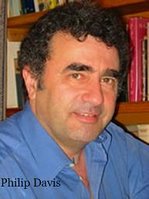 the study at the university's department of English, said: "The brain appears to become baffled by something unexpected in the text that jolts it into a higher level of thinking.
the study at the university's department of English, said: "The brain appears to become baffled by something unexpected in the text that jolts it into a higher level of thinking."It suggests that literature is not just some stylish add-on but is important to encourage more lateral thinking and learning.
"The study and the enjoyment of classical literature should become important again and not just a specialist activity."
from The Telegraph: The music of Shakespeare is food for thought
~~~~~~~~~~~
Great Regulars: On May 19 1536 Anne Boleyn was executed, possibly
 within sight of [Sir Thomas] Wyatt's cell. The stunning poem Who List his Wealth and Ease Retain is supposed to record this experience:
within sight of [Sir Thomas] Wyatt's cell. The stunning poem Who List his Wealth and Ease Retain is supposed to record this experience:The bell tower showed me such sight
That in my head sticks day and night.
There did I learn out of a grate,
For all favour, glory or might
That yet circa Regna tonat.
from Charles Bainbridge: The Guardian: theblogbooks: Through the eyes of a poet
~~~~~~~~~~~
Great Regulars: The poem is uninterested in certainty.
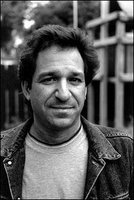 Instead, the poem is a sort of ecumenical exultation, with the premise of asking being all the blood and flesh, all the mystery and mysticism that's needed or available.
Instead, the poem is a sort of ecumenical exultation, with the premise of asking being all the blood and flesh, all the mystery and mysticism that's needed or available. Question
[by May Swenson]
from David Biespiel: The Oregonian: Poetry
~~~~~~~~~~~
Subscribe to:
Comments
(
Atom
)
